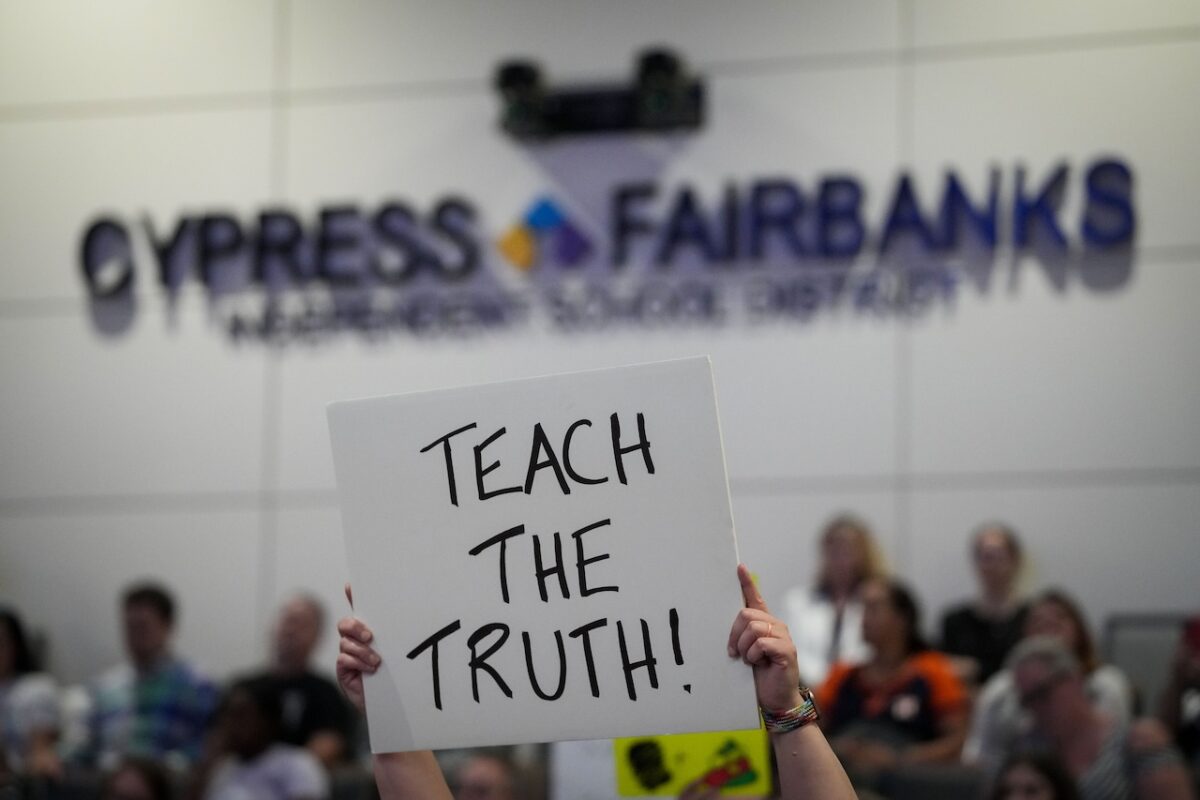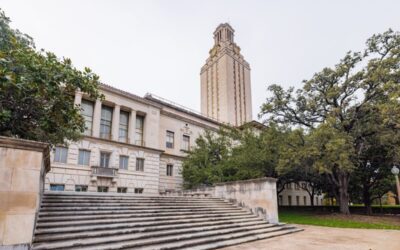
A person protests during a Cypress-Fairbanks ISD Board of Trustees meeting in 2024. (Photo by Michael Wyke via Getty Images)
In early November, Cypress-Fairbanks ISD voters elected three new trustees to their school board, breaking a conservative majority that was elected in 2023.
In recent years, conservative Republicans in Texas have targeted school boards to push their political agendas and influence what students learn—despite school board elections in Texas being officially nonpartisan.
In 2023, conservatives gained a 6-1 majority on the board of the Cypress-Fairbanks Independent School District, which is the state’s third largest district and is located northwest of Houston.
That majority went on to implement right-wing policies in its schools by eliminating half of the district’s librarians as part of budget cuts, approving Bible-focused elective courses, removing 13 chapters from state approved textbooks that discussed diversity, vaccines, and climate change, and approving policies that harm LGBTQ+ students.
The board also made book banning easier by implementing a new policy that requires library materials to be posted online for a 30-day period of public review before they are purchased.
But this year, after a race that included over $350,000 in campaign funds and heavily politicized campaign mailers, three candidates running on pro-public education policies and the separation of church and state were elected to the Cy-Fair ISD school board.
Lesley Guilmart in position 5, Cleveland Lane Jr. in position 6, and Kendra Camarena in position 7 all won their races after campaigning together, with each candidate receiving at least 44.8% of the vote in their respective elections on Nov. 4.
The results broke the conservative majority on the board and now conservatives are outnumbered 4-3.
“ Cy-Fair ISD was a school district that had a 6-1 board—majority of Christian nationalists—who made policy after policy, removing science from textbooks and targeting trans students, a plethora of policies that community members opposed,” Cameron Samuels, co-founder and executive director of Students Engaged in Advancing Texas, said during a panel at COURIER Texas’ “Faith, Freedom, and the Future of Texas” event on Nov. 5.
“There was only one ally that we had on the school board, and now with the results of last night, it’s clear that Cy-Fair ISD, the community, swept a victory for people who believe in inclusion, in diversity, that Texas is a majority minority state,” Samuels said.
The shift away from conservative candidates comes at a time when state lawmakers are weaponizing religion to undermine public schools in Texas, passing laws like Senate Bill 10. The law went into effect on Sept. 1 and requires that the Ten Commandments be displayed in public school classrooms.
But Samuels said communities pushing back against white Christian nationalism in their schools is a growing movement in Texas.
“It’s a testament to our voices, we’re pushing back in a variety of different ways, and we’re seeing that plateau,” Samuels added. “I feel like we do have an ability to curtail this, to really reclaim ownership of our education.”
School board members are one of the largest groups of elected officials in the country, and hold significant power over students’ education.
They’re responsible for hiring and evaluating a district’s superintendent, guiding everything from dress codes to disciplinary rules to curriculum, determining the property tax rate needed to fund the district’s budget, approving the district’s budget, and drawing school district boundaries.
They also authorize charter schools, monitor the success of campuses, and engage with the community through public meetings to listen to the concerns of parents and teachers. They’re also tasked with choosing whether to adopt Bluebonnet Learning—a controversial Bible-infused curriculum for use in public elementary schools that the Texas Board of Education approved late last year.
In some cases, local school board members garner national attention—including from former Vice President Kamala Harris, who called Guilmart to congratulate her on her win.
“It meant a great deal to me,” Guilmart said in an interview with Houston Public Media. “I know that the Democratic Party has learned some tough lessons in recent years about not paying close enough attention and investing in local elections, and so maybe this is an effort to rectify that. I didn’t run as a Democrat, and our victory was because of bipartisan collaboration and a message that resonated with many people from across the political spectrum.”
Members of Cy-Fair ISD’s board oversee 117,000 students as well as a $1.2 billion budget, and serve four-year terms.
“While there’s more work to do to make this board representative of the community and responsive to its needs, this victory turns the page on a dark chapter in this district’s history,” said Zeph Capo, president of the Texas AFT. “The trustees defeated routinely pushed the school board into a hard right turn to the extremist fringe, and voters said enough.”
Support Our Cause
Thank you for taking the time to read our work. Before you go, we hope you'll consider supporting our values-driven journalism, which has always strived to make clear what's really at stake for Texans and our future.
Since day one, our goal here at COURIER Texas has always been to empower people across the state with fact-based news and information. We believe that when people are armed with knowledge about what's happening in their local, state, and federal governments—including who is working on their behalf and who is actively trying to block efforts aimed at improving the daily lives of Texas families—they will be inspired to become civically engaged.















